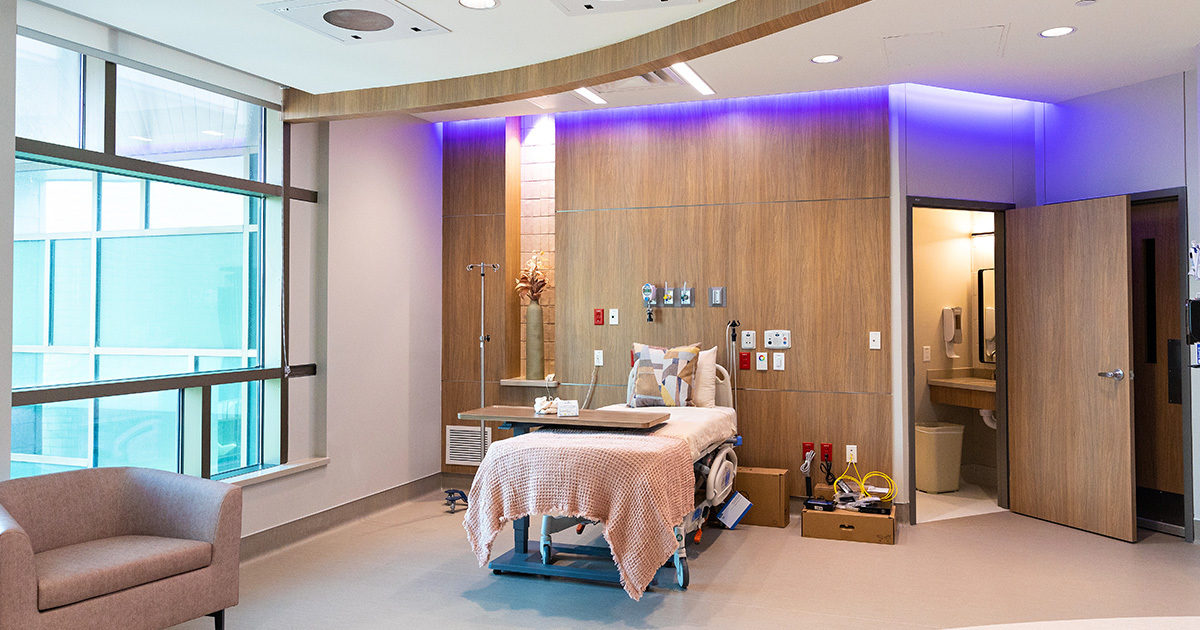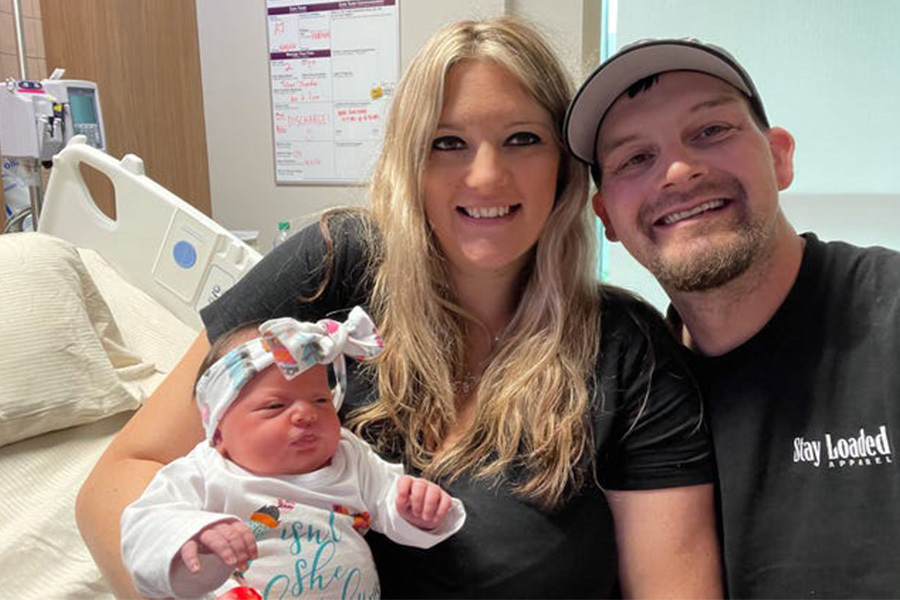UT Health Austin and Dell Children’s Medical Center Welcome First Baby Born in the New Specialized Delivery Unit
Patients of the Comprehensive Fetal Care Center are the first to deliver a baby in the Dell Children’s Specialized Delivery Unit
Written by: Lauryn Gerard

On July 7, 2021, parents Shelby Herrington and Logan Wade welcomed their daughter Paisley, who was the first baby born in the new Dell Children’s Specialized Delivery Unit (SDU). The SDU, which opened in early July and just in time for Paisley’s arrival, is an 11-bed labor and delivery unit that provides immediate comprehensive care to healthy mothers and their high-risk babies who are being cared for at the Comprehensive Fetal Care Center. Through this addition, babies gain access to the Dell Children’s Level IV Neonatal Intensive Care Unit (NICU), which has earned the highest designation possible for its ability to care for the most complex and critically-ill infants of all gestational ages. Special delivery services are available 24 hours a day, 7 days a week.

When Shelby was 24 weeks pregnant, an ultrasound indicated that her daughter’s kidneys were abnormal. The baby’s right kidney appeared to be enlarged and her abdomen was swollen. Shelby was referred to UT Health Austin fetal medicine specialist Kenneth Moise, Jr., MD, who serves as Director of the Comprehensive Fetal Care Center, a clinical partnership between UT Health Austin and Dell Children’s Medical Center.
Shelby and her husband traveled three hours from their home in Stephenville, Texas to Austin, Texas to receive specialized care at Dell Children’s. After a very thorough evaluation, Shelby’s unborn baby was diagnosed with fetal hydronephrosis, a condition in which excess fluid is detected in a baby’s kidney due to a buildup of urine. The most common causes of fetal hydronephrosis are obstructions that restrict urine from flowing through the kidney and into the bladder. In some cases, fetal hydronephrosis may require in utero treatment or treatment after birth, which may involve surgery to help resolve the issue and prevent long-term kidney problems.
“It was pretty scary,” shares Shelby.
In preparation for Paisley’s immediate care needs and potential surgical treatment after birth, Dr. Moise and Shelby’s labor and delivery team came together and created a plan for Shelby to deliver at the SDU. By delivering at the SDU, Paisley received the care she needed while Shelby was able to recover nearby.
When Paisley was born at 11:40 a.m. via cesarean section (C-section), she was immediately taken to the NICU to begin antibiotics and undergo diagnostic testing to establish how her kidneys were functioning and whether immediate surgical intervention would be needed. Paisley’s testing determined that her right kidney has an abnormality that was causing blockage and reflux. While Paisley did not need immediate surgery, she will continue to undergo monitoring as she may need surgery later in life. On July 10, 2021, Paisley and her family were able to return home to Stephenville.
“I think it went pretty well,” reveals Dr. Moise. “We were prepared and had all our ducks in a row…Everyone knew what to expect.”
Before the SDU opened, babies with fetal abnormalities, such as Paisley, were delivered at a separate hospital. Once stabilized, the Dell Children’s Medical Center NICU Transport Team would manage the safe travel of the baby to the Dell Children’s Level IV NICU for specialized care while the mother would remain at the hospital where they delivered until fully recovered. The baby’s specialists would communicate with the mother by video conference or phone rather than in person. This also often leaves the mother’s partner or support person shuttling back and forth between the two different hospitals at which the mom and baby are receiving care.
The Comprehensive Fetal Care Center and SDU not only give families access to high-quality, specialized care, but also the ability to remain close together for what can be a stressful experience for families of babies with fetal anomalies. The goal of this comprehensive program is to provide care that is as streamlined and stress-free as possible for both the mother and baby.
The Comprehensive Fetal Care Center opened in May 2021 and expects to deliver over 120 babies during the first year of operation and over 200 babies during the next. To be able to deliver at the SDU, moms must be at low risk for complications during delivery and have babies that are considered high-risk and in need of surgery, interventions, or specialized tests immediately following birth.
The Comprehensive Fetal Care Center is currently working with the SDU to provide care for moms with scheduled C-sections and, in a few months, will begin treating moms with scheduled inductions, followed by those with spontaneous deliveries. Dr. Moise expects to begin performing fetal surgery at Dell Children’s in September 2021.
“We do this in baby steps to make sure everyone is ready,” explains Dr. Moise.
The Comprehensive Fetal Care Center is the first and only comprehensive program in Central Texas that provides care for babies with congenital conditions, including care for the mother and baby during pregnancy, delivery of the baby, and care of the baby after birth, all in one place.
For more information about the Comprehensive Fetal Care Center or to schedule an appointment, visit here or call 1-512-324-0040.